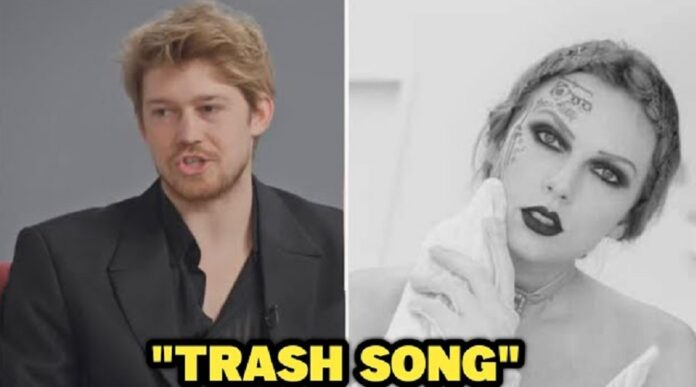Reading the papers this morning, I was worried. For a brief, terrible moment it looked like I was going to struggle to find anything to say about Joe Alwyn’s first major interview post-breakup with everyone’s favourite megastar, Taylor Swift.
Alwyn is on the press grind for his latest film, Poor Things director Yorgos Lanthimos’s Kinds of Kindness, which is out next week. His life hasn’t been particularly scintillating outside of Taylor: born in Tunbridge Wells, lived in North London, went to the University of Bristol. We were on the same course at university and I have absolutely no memories of him existing. A nice, normal, handsome man. So obviously when it comes to promoting a film, there’s only one thing anyone really wants to ask him about.
Happily, having refused to talk about his relationship with Taylor when they were going out, he’s now willing to address it. The interview, which is in The Sunday Times, does a sterling job of trying to find other things to talk about, but eventually they get on to The Big Topic, where Alwyn gives a very calm, formulaic response.
“I would hope that anyone and everyone can empathise and understand the difficulties that come with the end of a long, loving, fully committed relationship of over six and a half years. That is a hard thing to navigate. What is unusual and abnormal in this situation is that, one week later, it’s suddenly in the public domain and the outside world is able to weigh in.”
So far, so PR. An acknowledgement, a little pathos, the traditional 2024 rule that you blame social media and the internet for making life worse. Lots of boxes ticked.
Alwyn then goes on, when pressed about Taylor’s most recent album which seems to address their break-up: “As everyone knows, we together – both of us, mutually – decided to keep the more private details of our relationship private. It was never something to commodify and I see no reason to change that now,” Alwyn adds firmly. “And, look, this is also a little over a year ago now and I feel fortunate to be in a really great place in my life, professionally and personally. I feel really good.”
It was at this point that I was really starting to worry about a lack of meat to this interview. It seemed like Joe was so well media trained that he was going to open up about the most famous break-up of the 21st century without saying anything meaningful other than a slightly pointed comment about the commodification of pain.
Luckily for me, and for everyone else parasocially invested in this situation, Alwyn is human. And because he’s human he very, very nearly sticks the landing. But then the interview ends, and he just can’t manage it. He lets the sangfroid slip.
Laura Pullman, who interviewed Alwyn, chats to him about living in London and his desire not to move to America. At this point I can only imagine she’s slightly concerned about the juiciness of the interview she’s given up her afternoon for. She throws in a cheeky joke alluding to a pub called The Black Dog. It’s a place in Vauxhall which gets heavily name checked in one of Taylor’s latest songs, and there, it all changes.
“I joke that his chosen pub probably won’t be the Black Dog in Vauxhall,’” Pullman writes. “‘…which Swift fans have deduced is the place name-checked in her new song, also called The Black Dog (‘And so I watch as you walk / Into some bar called The Black Dog / And pierce new holes in my heart.’) Capitalising on this association, the pub has recently released merchandise: £50 hoodies, naff caps, tees and travel mugs. ‘I’ve never been to Vauxhall,’ says Alwyn, smiling a smile that hints that there is more to say.”
Oh Joe. So close, and yet so far. You very, very nearly managed to get in and get out without telling us anything, but like anyone who has gone through an enormous break-up, he can’t quite resist wanting a little dig.
There is no way on God’s green earth that anyone who has lived in London for their entire life hasn’t been to Vauxhall. It’s a terminus, an intersection. I’d argue that no-one wants to go to Vauxhall, but anyone who’s lived here for a few years has had to at some point. It’s understandable that Alwyn might have wanted to express his distaste for a pub flogging a load of merch tagged to a song about him breaking Swift’s heart.
But that’s not what this is about. He could have said a hundred other things in response to the question.
The media training should have kicked in with a smile and some bland remark – “Luckily there’s no shortage of brilliant pubs in London,” or something like that – and the whole thing would have been neatly over.
But you can’t media train away human nature. So instead he adds to the mystery of what really happens, he undermines Taylor’s narrative, he suggests that the song isn’t about him, that Swift is imagining things or making things up, that she had those feelings for someone else – a litany of explanations which absolve him of wrongdoing and pull him away from her spotlight.
It’s juicy, and painful, and exposing, and a million miles away from the stiff, formal sentiments he expressed earlier in the interview.
I get it. I’ve been getting divorced for what feels like eternity. However hard you try to be a good person and take the high road, it’s nigh-on impossible not to throw a little snide comment in to undermine the other person, to remind everyone that your version of events is the right one.
It’s nice to see that no matter how successful, or famous, or rich you are, there are some things that just don’t ever change. It sounds like the need to get in a little dig when someone asks you about your ex, is one of them.

















